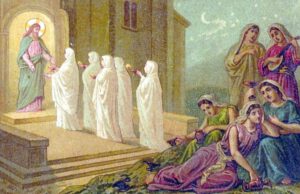Several themes emerge from the Readings of the thirty-second and third last Sunday of the liturgical year: commitment, faithfulness, perseverance, readiness. Since they are all hallmarks of the wise, Wisdom may well be considered the overriding idea.
The First Reading (Wis 6: 12-16) is about divine wisdom. The anonymous author of the deuterocanonical Book of the same name effectively resolves the question of the happiness of the just and the misery of the unjust. Placed as he was in an ambience that prized a materialistic lifestyle, he counters it with a rational basis for a life of faith.
The said author was possibly a Jew based in Alexandria, an Egyptian city that was in the grip of worldly-wise Hellenism. To the Greeks, wisdom was only a means to divine knowledge and contemplation, whereas to our author wisdom was indeed a way of life. He goes on to identify wisdom with the Spirit of God. This is one of the many aspects of our religion that makes it hugely different from the idolatrous ones.
Wisdom is thus a form of divine revelation; it is God acting in the history of the world created by His wisdom. Wisdom has prefigured the love of God and culminated in Jesus Christ, who is therefore called the “Wisdom of God” (cf. 1 Cor 1: 24, 30). It is this Wisdom Incarnate who exhorts us in the Parable of the Ten Virgins: “Watch, therefore, for you know neither the day nor the hour.”
These words wrap up today’s Matthew-exclusive Gospel story (Mt 25: 1-13) of a sundown wedding ceremony. Traditionally, a bridegroom, his family and friends would walk to the bride’s home for some rites. Thereafter, the bride would walk back with them, in a nuptial procession wending through the streets, to the groom’s home. The attendees carried their own torches, and on arrival, bridesmaids welcomed and assisted the bride.

Interestingly, the parable makes no mention of the bride: maybe because the story begins with the groom’s return journey. Besides, the focus is not on the bride but on the preparedness of the bridesmaids. And at what time the bridal party would arrive at the groom’s house was anybody’s guess; so, it was necessary for the bridesmaids to be in readiness. Sadly, five of them were not; the five haves refused to share, so the have-nots scurried for oil at the last minute. They were locked out and disowned by the groom.
When, where and why did Jesus tell this parable? It is a continuation of a dialogue Jesus was engaged in with his disciples (cf. Mt 24) regarding the end times. He wanted them to know that the ten (number of completion) virgins (all Christians, and symbolising purity) who have the oil (grace) when the groom (Saviour) comes again will be invited to the wedding feast (Kingdom of Heaven). Of course, Jesus is the Bridegroom, and His Bride, the Church (a variation of God as Husband of Israel, in the Old Testament).
As for us in real time, what should we find ourselves doing as and when the world ends? Nothing special; we should be going about our daily life normally. And what about those who have gone before us? In the Second Reading (1 Thes 13-18), St Paul states that we have no reason “to grieve as others do who have no hope.” To show that our ancestors have not died in vain, he says: “The dead in Christ will rise first; then we who are alive, who are left, shall be caught up together with them in the clouds to meet the Lord in the air; and so, we shall always be with the Lord. Therefore, comfort one another with these words.”
However, to be able to comfort one another, we ought to be one in mind and heart! Are all Christians on the same page as regards doctrine? Are the Ten Commandments cherished and practised? Do we think about Heaven, the angels and the saints as a living reality? Do we believe that we ought to know God, love and serve Him? Can we say with the Psalmist, “For you my soul is thirsting, O God, my God”? Are sin and grace for real, or inanities?
As we approach the end of yet another liturgical cycle, the Readings of the last three Sundays (12, 19 and 26 November) veer towards the nature of God’s kingdom in the end time, in Matthew 25: the parable of ten virgins (Mt 1-13), the parable of talents (Mt 14-30), and the parable of the last judgment (Mt 31-46), respectively. With this excellent runup to Advent, let us wait with joy and anticipation for the Lord’s coming.